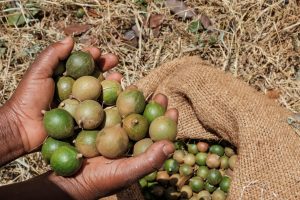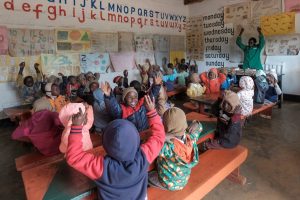Married with the global trend to plant-based eating (for health, ethical and sustainability reasons), the high protein monounsaturated (good fat) macadamia is an industry whose time has come. Climatically, macadamias do well in similar conditions to sugar and tobacco, and whilst these industries are experiencing lacklustre performance, macadamias offer a robust, healthier for the planet and people alternative to farmers.
Leading macadamia marketer and exporter, Green & Gold Macadamias (G&G), is responsible for selling close to a fifth of the world’s crop. It has a perspective that is entirely unique and differentiated from other marketers, in that it holds the most extensive processor partner affiliations in key growing regions in both emerging and established markets around the globe. Producers and processors in African countries South Africa, Kenya and Malawi, together with Brazil and Australia form G&G’s network.
The majority (65%) of available macadamia supply is produced in the African collective. This has significant economic and social benefits for South Africa, Kenya and Malawi especially. Africa is home to the lion’s share of the globe’s arable land and macadamia plantings remain on the rise in these regions. Other regions experiencing strong growth include Zimbabwe, Zambia, Mozambique and Swaziland.
“South Africa is the world’s leading producer of macadamia nuts, and through its macadamia exports, provides the country with valuable foreign exchange currency. This is significant for an emerging economy like ours. Encouraging infrastructure and other investment forms the building blocks for sustainable growth,” comments Allen Duncan, CEO Green Farms Nut Company (GFNC).
GFNC values include inclusivity and building community engagement: it is financially invested in, and partnered with, initiatives that impact over 30 emerging farmers. The business also runs mentor workshops for new, small farmers into the market, together with offering other skills development opportunities. It has built a nursery school for the children of those who are part of the project.

Kenya has led the way in negotiating and agreeing favourable trade agreements with key macadamia consumer markets and territories, setting a platform for the local industry to grow.
Brazil is faced with having to adapt from its predominant agricultural output, sugar. In 2018 sugar burning became prohibited in Sao Paulo state (responsible for 60% of Brazil’s sugar, and ethanol production) following legislation set out in 2008; farmers had 10 years to comply. Other major sugar growing regions in Brazil are following suit. This presents untapped opportunity for the country in that macadamias offer a viable alternative: orchard plantings can take place in existing agricultural hubs and not through encroaching on the surrounding natural environment.
“Cane growing region, San Paolo, alone has 5.1 million hectares planted to sugar. With, by comparison, around 7 500 hectares planted to macadamias in the whole country (over 50% of which are in San Paolo state). The current macro context of Brazil’s agricultural industry is serendipitous in its timing to growing the macadamia industry at large. This comes with unparalleled scope for socio and economic upliftment too,” shares Maria Teresa Camargo, President, Queen Nut. Queen Nut is Brazil’s leading processor of macadamia nuts.
It appears these social benefits are already in play, in a big way. It is perhaps Green & Gold’s largest producer partner of macadamias in Africa (and top 5 in the world), Maclands, that best embodies this. This pan-African business has orchards and processing plants in Kenya, Malawi and South Africa, and creates 5 213 jobs through their operations in these regions.
“Maclands is deeply committed and invested beyond the obvious benefits of creating employment opportunities (in countries with significantly high unemployment rates). Our ethos is about long-termism and sustainability. For all our stakeholders, not just shareholders, but customers, suppliers and importantly our employees too. We care about our people experiencing a rewarding existence when employed by the business and want to leave a legacy that local communities are proud of,” says Chris Flowers, Regional Director, Maclands.
It understands intrinsically that the business needs to exist in harmony with the community in which it operates, since it is the community that gives them license to do business in that region. This is demonstrated through best in class initiatives, building houses for staff with running water, and opportunities to create vegetable gardens. Within the villages, children of employees have access to schooling, and medical care and clinics are available to staff and their dependants till they’re 18.
The organisation is rooted in creating a healthy agricultural environment supported by key infrastructure developments like building dams, and in Malawi specifically a project that focuses on reducing deforestation of indigenous bush.

Queen Nut’s social programmes stretch far and wide from basic human rights initiatives to those that encourage cultural growth and participation. Many of which focus on women, and include:
- Athlete of the Future Project that aims to encourage low income children and adolescents to develop an interest in sport.
- Proerd Project, in partnerships with the military police, which is a drug resistance and violence education programme.
- Adolescent Apprentice Project is a project around career preparedness through life skills training and exposure.
- Apae Pilot Project is a professional kitchen that teaches children and teens with special needs to make cake and salty pastries to help strengthen motor co-ordination.
- Child Friendly Company Project that acts against child labour and promotes vocational training and access to protected employment for adolescents.
- The Macadamia Festival is a cultural extravaganza to promote tourism, together with raising the profile and opportunity of the macadamia sector.
It too has a strong focus on employees through rigorous safety training programmes and access to medical, gynaecological and detail assistance. Study and career advancement opportunities are also facilitated. Queen Nut’s environmental awareness policy includes recycling, energy saving and driving water efficiencies.
“G&G is extremely proud to be partnered with business like GFNC, Maclands and Queen Nut. All of whom pave the way, and enable, opportunity to sustainable economic upliftment and growth. Particularly in rural areas, which are often most vulnerable to cultural and value system fragmentation,” concludes Brian Loader, CEO, G&G.
Press release (edited)
Find the AgribookDigital page on Macadamia nuts at https://agribook.co.za/horticulture/macadamia-nuts/
